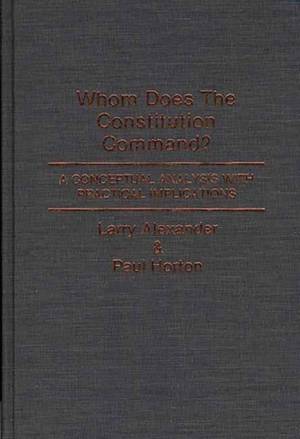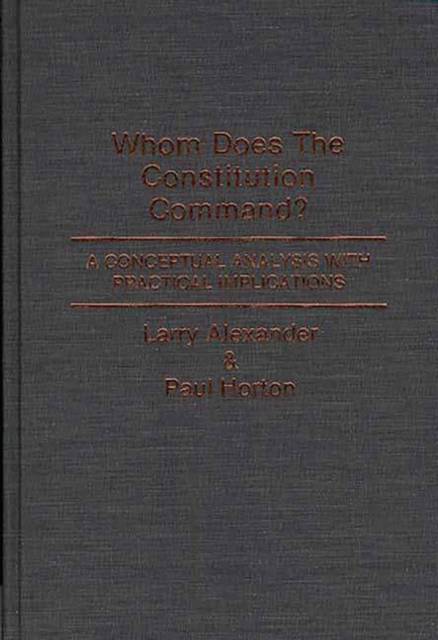
- Retrait gratuit dans votre magasin Club
- 7.000.000 titres dans notre catalogue
- Payer en toute sécurité
- Toujours un magasin près de chez vous
- Retrait gratuit dans votre magasin Club
- 7.000.0000 titres dans notre catalogue
- Payer en toute sécurité
- Toujours un magasin près de chez vous
Whom Does the Constitution Command?
A Conceptual Analysis with Practical Implications
Larry Alexander, Paul HortonDescription
Alexander and Horton have attempted to untangle one of the most difficult and potentially far-reaching questions in constitutional law: at what point does constitutional law leave off and `plain old law' remain to occupy the US legal system's field of play? In addressing this question the authors take on two of the most murky concepts in constitutional law, `state action; and `under color of law.' In their attempt to make sense of these notions they develop models that potentially could provide coherent, principled answers to the problems created by the Supreme Court in its decisions in this area. . . . This work, the first monographic treatment of this question, is written purposely at a fairly high level of abstraction and is clearly intended for advanced students and judicial decision makers. Recommended for advanced students. Choice
Despite the guidelines provided in the Constitution, many fundamental constitutional issues remain open to debate after two centuries. One of the thorniest centers on the division of authority. Who is actually mandated by the U.S. Constitution to carry out the duties it imposes? Alexander and Horton address this question by developing several models of constitutional interpretation and applying them to state action, under color of law, and other complex doctrines in constitutional jurisprudence that have been created to deal with problems of distinguishing unconstitutional from merely illegal authority. Presenting three basic analytical models--legalist, naturalist, and governmental--together with several possible permutations, the authors clarify the assumptions underlying these current doctrinal tangles and illuminate many conflicts and inner inconsistencies of modern constitutional law. They examine the implications of each model in terms of its application to relevant court precedent and the way it would deal with specific constitutional provisions such as the Thirteenth and Fourth Amendments and the Commerce Clause. The authors conclude that only two of the possible models can be considered to be principled.Spécifications
Parties prenantes
- Auteur(s) :
- Editeur:
Contenu
- Nombre de pages :
- 181
- Langue:
- Anglais
- Collection :
Caractéristiques
- EAN:
- 9780313262166
- Date de parution :
- 03-08-88
- Format:
- Livre relié
- Format numérique:
- Genaaid
- Dimensions :
- 156 mm x 234 mm
- Poids :
- 435 g

Les avis
Nous publions uniquement les avis qui respectent les conditions requises. Consultez nos conditions pour les avis.






